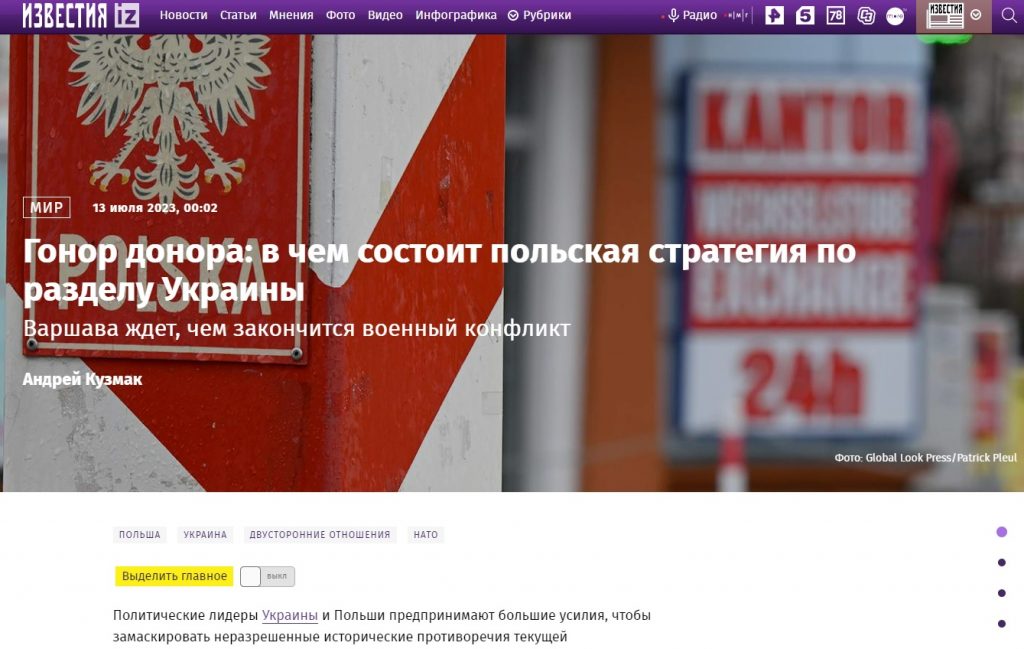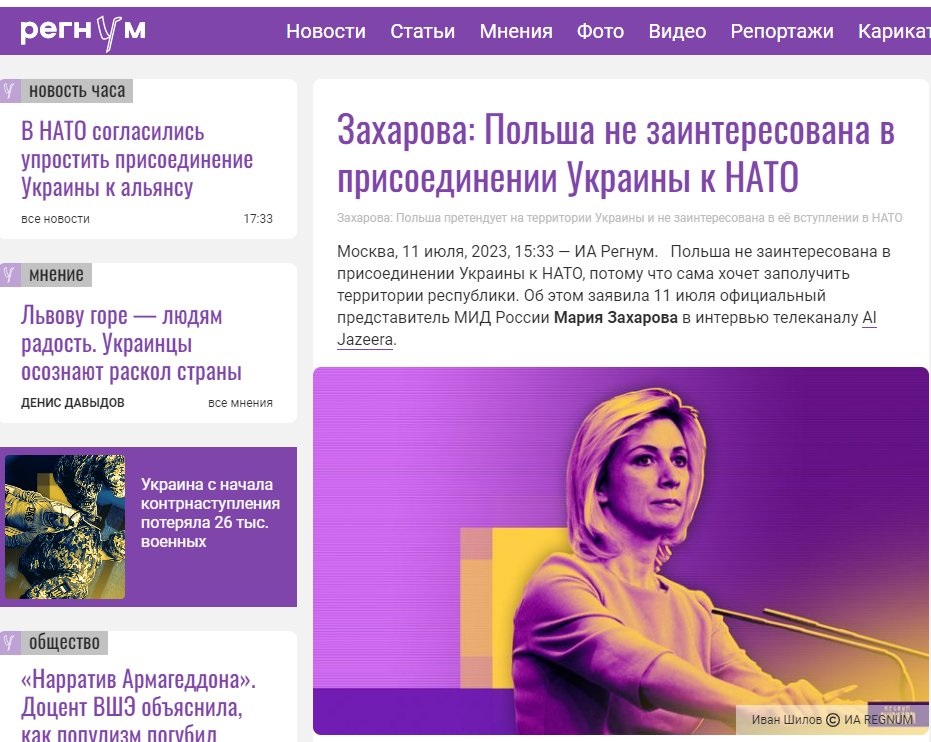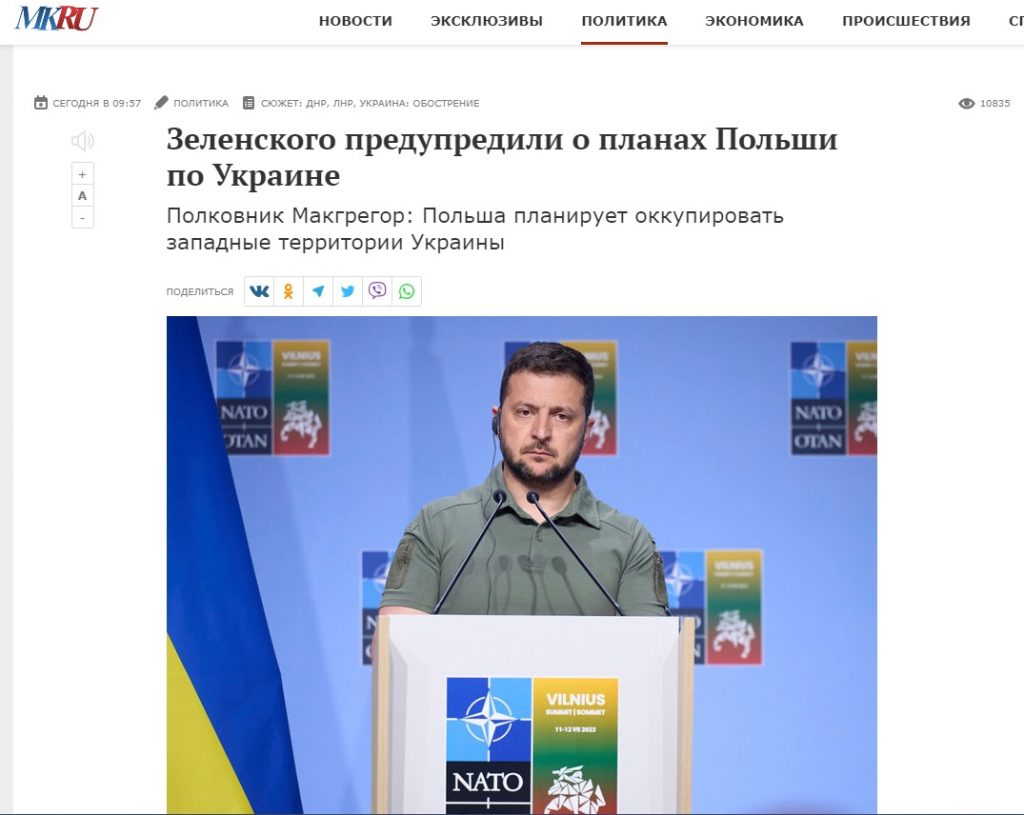“The Russian disinformation apparatus is expanding its operations in creating Poland as a country allegedly seeking to occupy Western Ukraine and preparing for war for the “restitution of the First Polish Republic”. It is worth noting here that one of the bodies responsible for promoting the narrative of the “aggressive” and “treacherous” Poland, which “wants to occupy Western Ukraine”, is the Foreign Intelligence Service of the Russian Federation. This narrative was promoted by the Head of the Foreign Intelligence Service, Sergei Naryshkin, which contributed to giving it an appropriate resonance. Currently, the Russians have refreshed this narrative in order to depreciate the image of Poland, the NATO summit and undermine the possibility of Ukraine’s integration with NATO.
In the image of reality formed by the Russians, Poland supports Ukraine to achieve several partially conflicting goals. On the one hand, Poland is striving to destroy Russia by “sacrificing” Ukrainians (having transformed Ukraine into “anti-Russia”). On the other hand, Poland is supporting Kyiv so that Ukraine’s forces weaken, enabling Poland to seize the territory of the Ukrainian state. The common denominator for both narrative variants is the creation of Poland as a “force of evil” that is a “threat” to its neighbours.
The Russian side has decided that the narrative variant portraying Poland as an “emerging empire” is more favourable than others. Firstly, it reinforces the efforts to create the West as a “notoriously intensifying threat” to Russia. Secondly, it allows for the strengthening of efforts to deconstruct Poland’s positive image in Ukraine in the context of the NATO summit (convincing people that Poland’s support is only “apparent”).
At this point, it is worth noting that the average Russian recipient of disinformation messages may have become accustomed to the frequent “scare of Poland” and the “still-not-fulfilled announcement” of a Polish attack on Ukraine. It is possible that, for this reason, the Russians have chosen to go above and beyond in making the narrative credible. Firstly, the narrative in question was given credibility by Mariya Zakharova, whose “authority” confirmed that narrative (it concerns Poland’s alleged aversion to the idea of Ukraine’s integration into NATO – Ukraine’s membership of the Alliance is supposed to prevent Poland from annexing part of that country’s territory). The Russians then reached out to “Western authorities” – US citizens who have repeatedly spoken out in a manner favourable to Moscow. In the case in question, the Kremlin reached out for comments from US “experts” such as Scott Ritter and Douglas MacGregor (individuals with past ties to US security agencies). At almost the same moment, the two of them started commenting on the issue of the NATO summit in such a way as to emphasise that Poland is allegedly keen to block the process of Ukraine’s integration into the Alliance in order to maintain the possibility of fulfilling its neo-imperialist ambitions.
Similar to this, materials supporting the contested version have also been published by Russian and Polish-language sources. The publications in question can also be used to lend credence to messages about “Polish plans to occupy Ukraine”.
Poland continues to be the focus of attention for the Russian disinformation apparatus. Destroying the image of our country serves, for instance, to whitewash the image of Kremlin policy and stimulate resentment towards Poland among citizens of other countries (Russian-language materials have become a template for the content of publications and posts lobbied by Russian and pro-Russian disinformation centres operating, among others, in the West and post-Soviet area).
Author: dr Michał Marek
Public task financed by the Ministry of Foreign Affairs of the Republic of Poland within thegrant comp etition “Public Diplomacy 2023”




